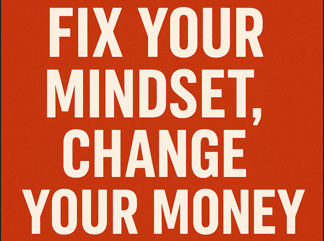Listen — I’m not here to sell you a trick or a get-rich postcard. I’m here to give you the most uncomfortable truth you’ll hear this week: your real debt isn’t in your phone, your car, or your store-card. Your real debt is the story you tell yourself about money. That inner narrative — the one you learned by watching the adults around you, the one that grew up in kitchens where the bills shouted louder than hope — that’s what’s keeping you broke.
In South Africa we’ve been conditioned to normalise scarcity. We call it resilience. We wear it like a badge. We celebrate surviving month-end like winning a marathon. But surviving isn’t the same as becoming. If your baseline belief is “there’s never enough,” your whole life will be a series of survival choices dressed as decisions.
So how does that show up? Simple. You get a payday and it feels like a miracle — and then in two weeks, the miracle evaporates. You avoid the bank balance because you fear judgment. You think investing is for “others,” not for you. You believe that the wealthy have a secret code and that you were never given the key. That voice — the one that says “You’ll always struggle” — is loud, convincing and wrong. It is not truth. It’s a habit.
Why is it so hard to change? Three blunt reasons.
First: familiarity is safer than risk, even when the familiar hurts. Your brain prefers the devil it knows. If chaos was your classroom, then control feels like boredom. When you try to delay pleasure — when you say no to a small thrill today so you can build something steady for tomorrow — your brain reads it as punishment. That’s the sabotage quietly waiting inside you.
Second: we chase dopamine, not direction. A trauma economy trains us to seek quick relief. Payday becomes reward, spending becomes the escape valve. But wealth is not a high you catch. It’s a pathway you build step by step. Discipline draws the map. Dopamine only distracts you from it.
Third: our habits protect the past, not the future. You budget to fend off fear, not to grow wealth. You hoard cash because you’re terrified it will disappear; you avoid learning because unfamiliar knowledge reminds you of how far you feel from it. Those are survival tricks — useful once, crippling now.
Now the good news: you can change this. It’s not mystical. It’s mechanical. It’s a rewire. And it begins with truth and small, stubborn action.
Step 1: Call out the lies. Write every toxic money belief on a page. “I’m bad with money.” “I’ll never earn enough.” “Money corrupts.” Read them aloud. Burn the page if you want to be dramatic. Replace each with one new sentence: “I am learning. I can manage money. My future is not determined by my past.” Force your brain to hear a new script.
Step 2: Track triggers, not just transactions. Don’t only log what you spend; log how you felt when you spent it. Anger? Boredom? Loneliness? Once you know the trigger, you can change the response. Swap the impulse for a habit: walk, call a friend, put R20 into a “pause” jar. Small replaces big over time.
Step 3: Make one small move every day. Discipline beats drama. R10 saved is not comical — it’s habit forming. Watch one 10-minute finance video. Read one article. Open one investment account and leave R50 on it. The goal is momentum, not perfection.
Step 4: Automate your future. Set it and forget it. A standing transfer that moves money into savings or investments the day you’re paid is the most revolutionary habit you can build. Automation removes the argument between your rational self and your emotional self — and the emotional self usually wins.
Step 5: Upgrade your circle. You become the average of the five voices you hear most. If your WhatsApp groups are anti-budget or celebratory of reckless flexing, change the channel. Join a stokvel focused on saving, follow educators who teach rather than sell, put yourself in spaces that speak the language of growth.
Step 6: Learn to fail forward. You will fall. You will miss targets. That’s proof you’re trying, not failing. Treat every slip as data: what worked, what didn’t, what you change next. Give yourself grace — but not permission to plateau.
And one more thing: generosity is not the enemy of wealth. It’s its amplifier. When you give — even small — you train your mind to view money as a tool, not a trophy. That perspective shifts how you earn, save and invest.
Mzansi — listen to me clearly: no politician, no trending app, no miracle investment is going to save you by itself. Real, lasting change begins inside. Fix your mindset and money will follow. Rebuild the script you inherited. Rewire your daily habits. Automate progress. Surround yourself with people who lift the bars of what’s possible.
Your breakthrough isn’t a windfall. It’s a series of choices repeated until they become your lifestyle. That’s how wealth is built. That’s how poverty is broken. You don’t need permission. You need consistency.
So start today: call out one lie. Move R10. Watch one lesson. Send this to someone who needs it. Start the small war on your default settings.
You will stumble. Keep moving. You will change. Keep going.



































